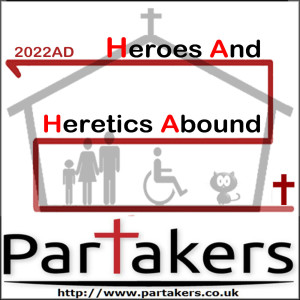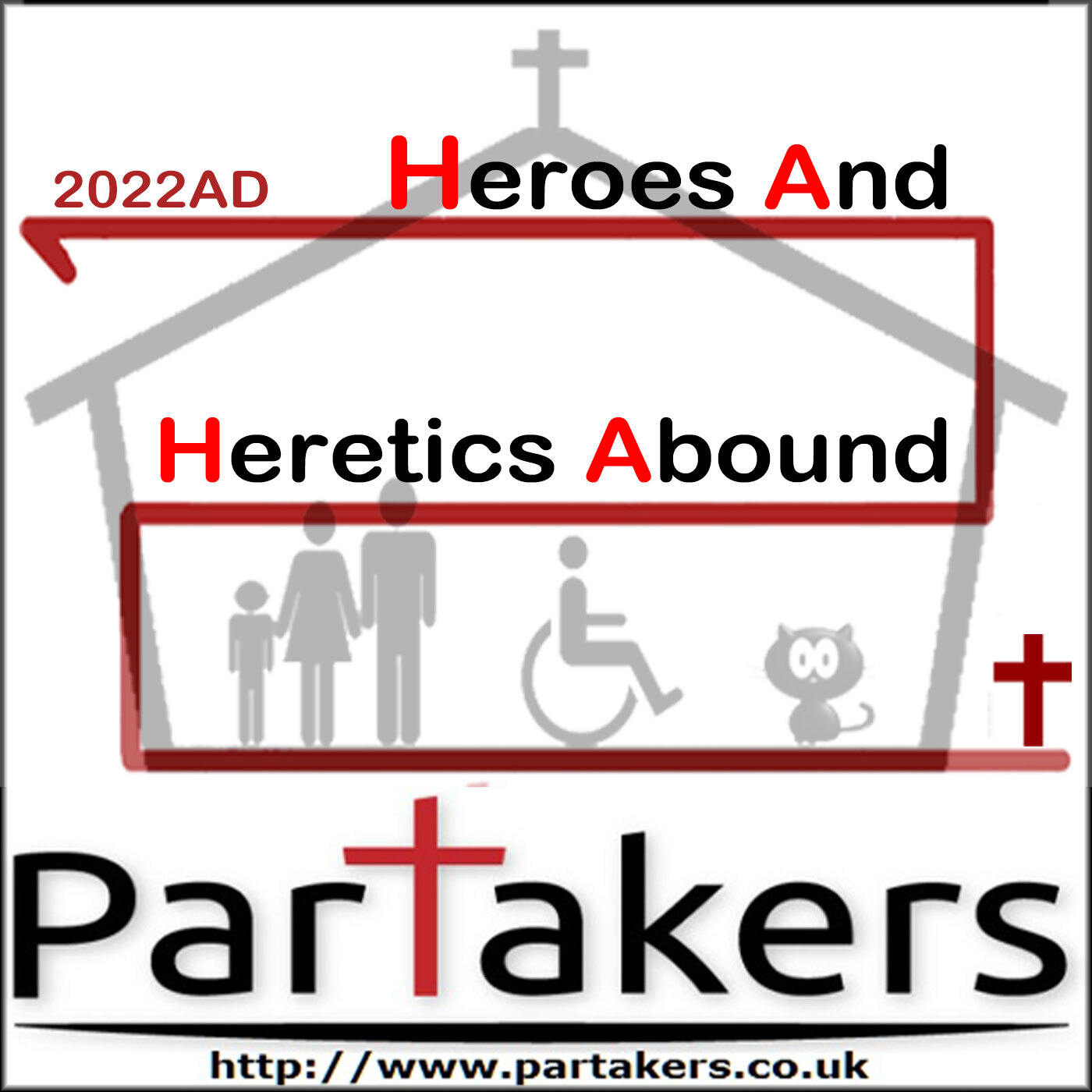
432.5K
Downloads
3360
Episodes
G’day and welcome to Partakers Christian Podcasts! Join us for uplifting Bible teaching, inspiring readings, heartfelt worship, powerful prayers, and fascinating church history. Whether you’re new to faith or growing deeper in your journey, we’re here to encourage and equip you. 🎧 Tune in, interact, and be inspired—wherever you are in the world.
G’day and welcome to Partakers Christian Podcasts! Join us for uplifting Bible teaching, inspiring readings, heartfelt worship, powerful prayers, and fascinating church history. Whether you’re new to faith or growing deeper in your journey, we’re here to encourage and equip you. 🎧 Tune in, interact, and be inspired—wherever you are in the world.
Episodes

Friday Oct 17, 2025
Church History Part 7
Friday Oct 17, 2025
Friday Oct 17, 2025

Church History Part 7
4th & 5th Century - Leading Thinkers and Councils
~ G’day and welcome to Partakers and to our series, HAHA – Heroes and Heretics Abound. Together we will look at the story of the church from its origins to the Age of Reasoning in the 18th century. Last time we looked at the change for Christianity under Constantine – the church changed from being persecuted to being, as some would, compromised with its new found freedom.
During this time as well, Christian thinking was being developed and clarified. There were several Councils called over the next 100 years which served that purpose. But let us look firstly at some of the leading Christian thinkers of the time, who helped formulate what we believe as 21st century Christians.
Leading Christian thinkers of the 4th & 5th Centuries
Athanasius 296-373. Deacon of the church in Alexandria, opposed Arius in the Council of Nicea. Became Bishop of Alexandria in 328. Athanasius was exiled 5 times because of his opposition to Arianism! Athanasius was the champion of orthodox Christian thinking!
Hilary of Poitiers 295-368. Bishop of the Church at Poitiers, France. He was the main defender of orthodoxy in the Western Church who opposed Arianism.
Ambrose of Milan 339-397. Ambrose became Bishop of Milan in 374 at the age of 34, and was in that role for 23 years. He was the Governor of Milan, the capital of the Empire, before being chosen as bishop by popular vote or choice. He was unbaptized, untrained, and resisted the peoples choice initially. Ambrose was noted for his courage and unbending character, completed the overthrow of Arianism in the Western church.
Aurelius Augustine 354-430. Augustine was born of a pagan father and a Christian mother in Africa. He was converted to Christianity at the age of 32 and became Bishop of Hippo in 393. He is certainly one of the greatest theologians and thinkers in the history of the church. Most of mainstream Christianity today draws upon his teachings and thoughts. He was the first to clearly explain and express the doctrine of God's grace - that salvation was a gift of God and could not be earned. He taught that there was no salvation outside of the church. However he did promote a belief in purgatory and the use of relics, which much of the evangelical church today would consider in contrast to Christian teaching.
John Chrysostom 347-407. He was known as 'John the Golden Mouth', because he was a great orator, teacher and preacher. He was the Bishop of Antioch & Constantinople in the Eastern Church.
Jerome 340-420, was born in Italy, which was part of the Western Church. Jerome translated the Hebrew Old Testament into Latin (the popular language of the day) and the Latin Vulgate which was accepted by the Roman Catholic Church as its official Latin translation for centuries. Jerome lived in Bethlehem as a hermit for 35 years, and strongly promoted the monastic lifestyle as spiritually superior.
Leo I (Leo the Great) 390-461. Bishop of Rome 440-461 was born in Tuscany, Italy. He made a major advance in acceptance of the Bishop of Rome as the universal Bishop, arguing as he did from Matthew 16:18. He was referred to as the Pope by many Bishops at the Council of Chalcedon (451), and this was largely accepted in the Western Church. This was strongly supported by the Roman Emperor, who made it an offence against the State to resist the Bishop of Rome, or Pope. As we can see by these people, Christian doctrine and thinking is continually developing. However some incorrect thinking was also invading the church. For example Arianism and the heretical thoughts of Arius were rife! Therefore over the next 100 years, various Church councils were called, not only to combat Arianism but also other heresies – some very subtle ones!
Councils of the 4th & 5th Centuries
The Council of Nicea 324 AD, called by Constantine to resolve the Arian heresy. Arius, an elder from Alexandria taught that Jesus Christ was merely a created being and denied his deity. Athanasius, a deacon in the Alexandria church, opposed Arius and supported Christ's deity. The debate raged over whether Jesus Christ should be described as 'the same essence as the Father' (homousious), or 'like essence as the Father' (homoiousios). Eventually it was accepted that Jesus Christ was 'the same essence as the Father '. The Nicene creed contains the final statement about Jesus Christ's deity.
Council of Constantinople 381 AD, was called to discuss Apollonarianism and Sebellianism. Apollonarianism was a theory proposed by Apollinaris the Younger, Bishop of Laodicea. This theory was that Jesus had a human body and a human sensitive soul but didn’t possess a human rational mind but rather a divine mind. There was the theory of Modalism or Unitarianism which proposed that the Heavenly Father, the Resurrected Son and the Holy Spirit were different modes one God, rather than three distinct persons within the Godhead. Sebellianism differed slightly from this in that Sabellius, its proposer, acknowledged that Jesus was fully God. At the Council of Constantinople, these teachings were condemned as unbiblical and therefore were heresies. The Holy Spirit was affirmed to be a person, equal with the Father and the Son.
Council of Ephesus 431 AD, was called to discuss Nestorianism, at which it was condemned as a heresy. Nestorius protested, stating that Mary was the mother of the humanity of Jesus Christ, but not of His deity. Nestorian Christians engaged in a great missionary endeavour reaching across Asia to China in the Middle Ages. The council condemned and deposed Nestorius. Eutyches, Nestorius' opponent, was deposed 20 years later with being a heretic, teaching Jesus Christ had only a divine nature and was not fully human.
Council of Chalcedon 451 AD 500 bishops met and affirmed that Jesus Christ had 2 natures, both divine and human, unchangeably united in one person. Condemned Eutyches who believed Jesus Christ had only the 1 divine nature. The heretical thoughts of Arianism, Nestorianism, Apollonarianism, Unitarianism, Modalism and Sebellianism are still in some religious thoughts today – particularly in the cults such as Mormonism and Jehovah Witnesses.
Tap or click here to save this as an audio mp3 file
~

No comments yet. Be the first to say something!